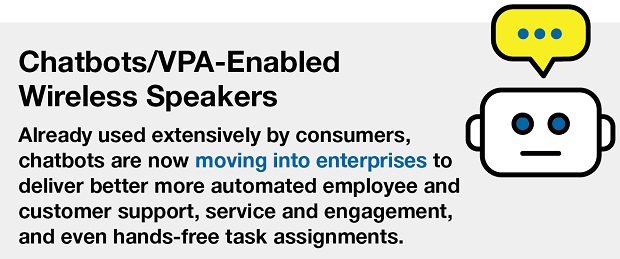A quarter of all customer service operations will be handled by chatbots by 2020, according to new research.
The report, from Gartner, indicates that despite less than 2% of businesses using virtual customer assistants (VCA) in 2017, the technology will become much more popular in the immediate future, citing organisations reporting a reduction of 70% in call, chat and email enquiries after implementing the software.
Its research found that these companies are also seeing increased customer satisfaction and a 33% saving per ‘voice engagement’ at the same time.
Gartner’s managing vice president, Gene Alvarez, said more than half of organisations have already invested in chatbots for customer service because they are beginning to realise the advantages of automated self-service, as well as the advantage of being able to escalate a problem to a human agent in complex situations.
“As more customers engage on digital channels, VCAs are being implemented for handling customer requests on websites, mobile apps, consumer messaging apps and social networks,” Alvarez said. “This is underpinned by improvements in natural-language processing, machine learning and intent-matching capabilities.”
Gartner also found that 84% of organisations expect to increase investments in customer experience (CX) technology in the year ahead – and by 2019 20% of brands will abandon their mobile apps.
“Many brands are finding that mobile applications are not delivering the level of adoption and customer engagement they expected,” Gartner’ research read. “Original return-on-investment calculations are missing the mark due to the cost of support, maintenance, upgrades, customer care and marketing to drive downloads.”
Instead, brands are now investing to build presence in consumer messaging apps, such as Facebook Messenger and WeChat, via bots, to reach customers where they spend more of their time, the report said.
The analyst house added that by 2022, two-thirds of all customer experience projects will make use of IT, up from 50% in 2017.
Trust issues hamper take-up
Robert Weideman, EVP and General Manager of the Enterprise Division at Nuance Communications, noted that with consumers still struggling to trust virtual assistants to carry out complex tasks, organisations must demonstrate that they will receive a high quality user experience, which can be achieved through human assisted virtual assistant, or HAVA.
“Conversational AI breakthroughs have led to a new generation of customer service virtual assistants (VAs) specific to your bank, your telco and your pizza ordering, all providing personalised, concierge-like service”, Weideman said. “The rapid rate of adoption has also increased user expectations, with research from Nuance finding that 73% of consumers believe that interacting with an automated system that they could converse with would significantly improve their experience.
“Despite this, a large number of consumers still struggle to trust VAs to assist them with complex tasks, such as handling their utility, banking or insurance issues (35%, 29% and 16% respectively). In order to conquer this trust issue, firms will need to show that through their VAs and human agents, customers will receive the same high quality experience.
“To achieve this level of trust, organisations will need to show that customers will get the same high quality experience across both VAs and human agents. HAVA (Human Assisted Virtual Assistant) will play a great role in ensuring this, looping in human agents to help answer those questions that VAs are unable to, which will ensure a high level of service to the customer, whilst also providing a learning loop that updates the VA’s “brain” in real time so that it can resolve similar cases in the future. Assuring users of the security of their accounts, when tasks are managed by VAs, will be another crucial factor. That is why we are seeing many banks and telcos increasingly replacing security questions with biometric authentication.”

